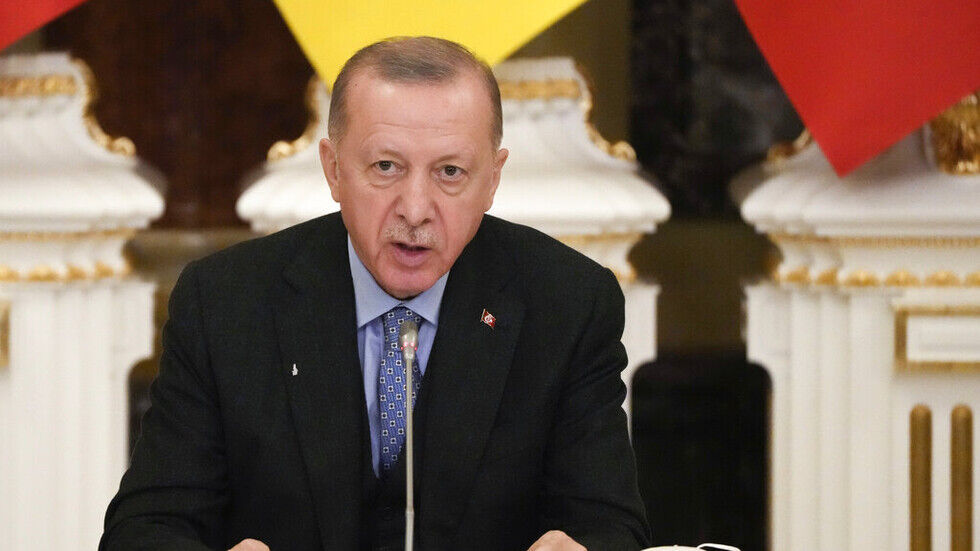Dr. Vali Golmohammadi, speaking in an interview with the website of the Strategic Council on Foreign Relations, stated that the Ukraine crisis has been a central challenge for Turkey’s national interests and regional and national security from the very beginning, adding: To prevent the crisis from happening, Turkey offered mediation to the two sides, which was welcomed by both sides, but this did not happen and the Russians reached the conclusion that the only option they had was a military strike.
The university professor continued: With such measure, Erdogan immediately criticized the NATO and Western powers and said that they were the ones who provoked Russia by announcing NATO’s entry into Ukraine; thus the initial provocation was from the European powers; the Europeans, on the other hand, blamed the Turkish government for selling “Bayraktar” drones to Ukraine and rendering open military support to that country, which provoked Russia and gave Russia the impression that NATO was comprehensively selling weapons to Ukraine.
Golmohammadi, saying that Turkey’s main position was to prevent the outbreak of war, cited Turkey’s extensive bilateral relations with Ukraine and Russia as the reason for such position, adding: Russia is Turkey’s third largest trading partner and their trade volume is estimated at 20 billion dollars. They had important understandings in the fields of energy and security, including the subject matter of buying the S400. Meanwhile, the Russians are working on the Akkuyu Nuclear Power Plant in Turkey.
Recalling that there are several strategic ties between Turkey and Russia in various conflicts and that Turkey did not want to harm this level of relations, the Turkish expert also referred to the extensive Ankara-Kiev relations and clarified: military and security of the Black Sea are also benefits. It threatens Turkey and therefore it did not welcome it.
Turkey’s efforts for positive balancing
He stressed: Turkey’s policy on the Ukraine crisis was a positive balancing measure and sought to manage tensions and differences. Of course, the Russians assessed that Turkey was acting in support of Ukraine; because it did not want the Donbass region be joined to Russia. They also opposed the annexation of Crimea and have not yet recognized the annexation of Ossetia, Abkhazia and Crimea; therefore their position with regard to Donbass was clear.
Golmohammadi added: Turkey provided weapons to Ukraine and sent 20 drones from the contract for the sale of 100 Bayraktar drones, which has annoyed the Russians in the current war. Turkey, on the other hand, has political and diplomatic support for Ukraine and is trying to make Russia retreat.
The expert on Turkey affairs added: But when Zelensky asked Erdogan to close the Bosphorus and Dardanelles on Russian warships, Turkey did not do so for political and strategic reasons, although it has shown positive signs in this regard. If this was done, the situation on the ground would have changed in favor of Ukraine.
Turkey’s considerations for Bosphorus
He explained: For Turkey, this is a strategic decision that will affect the fate of the war and will have consequences for Ankara. In fact, the Montreux Convention is an agreement that is completely in favor of Turkey and shows its sovereignty over the Strait. Therefore, under the current situation, Turkey does not want to take any action that would involve it with the Russians and cause the country to reconsider the provisions of that agreement. Any revision of the terms of the agreement will be to the detriment of Turkey. At one point, Stalin even called for change in it, which the Westerners prevented by bringing Turkey into NATO.
Golmohammadi stated that under such circumstances, Turkey will not allow NATO warships to cross the Strait; because it knows that there is no guarantee that NATO will support Ankara in the event of a conflict, adding: The Turkish elite refer to the Black Sea as the Russian Lake because they envision basically no military action for Turkey. According to them, the region is under Russian military sovereignty, and its Achilles heel is considered to be the Bosphorus and the Dardanelles.
Turkey an uncertain partner
The university professor, emphasizing that Turkey is basically not a certain partner for any of the countries, referred to Turkey’s criticism of NATO that the reaction of NATO and Western countries to Russia’s attack on Ukraine was not “decisive and determined” and said: In fact, Turkey is an “uncertain partner” for the West and the East, which has become especially prominent under the current situation. This country does not want to accept any obligations that it could not evade easily and in various circumstances.
Recalling that the fate of some of Turkey’s policies and interests is tied to Russia, Golmohammadi called the fields of energy, security and arms purchases among the platforms that make cooperation with Russia a necessity for the country, and said: In Libya, Syria, Iraqi Kurdistan and the South Caucasus as well as other regional conflicts a kind of strategic similar fate has been created between Russia and Turkey, and they are somehow side by side or opposite to each other, and know that any differences in Ukraine will overflow to the level of their differences in other regions.
Stressing that Russia is a major national security threat to Turkey and Ankara does not want to stand up to Moscow, he added: Turkey is frustrated by Europe’s passivity and is convinced that it should not confront Russia due to NATO’s concerns; therefore it tries to manage its differences with Russia and not stand against it.










0 Comments